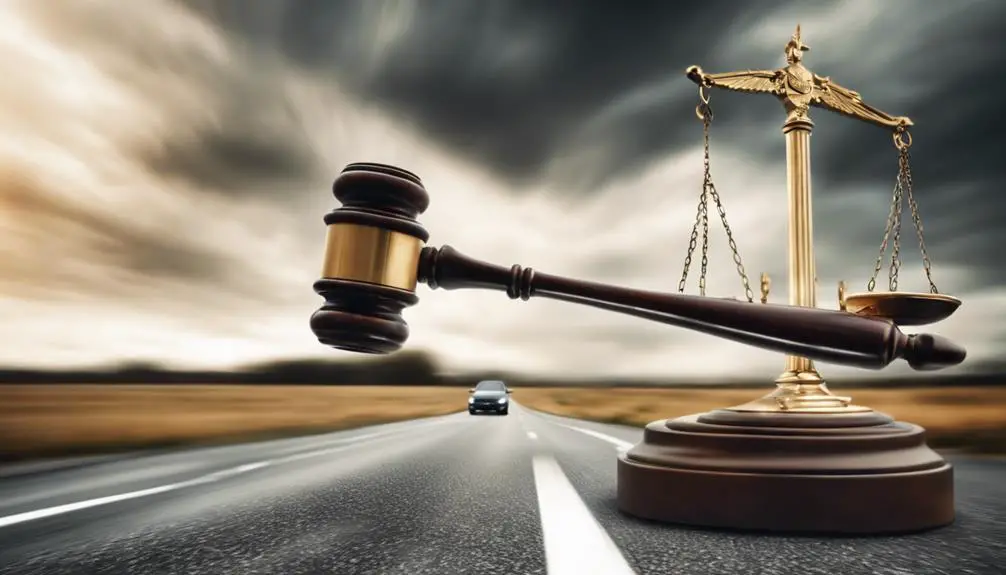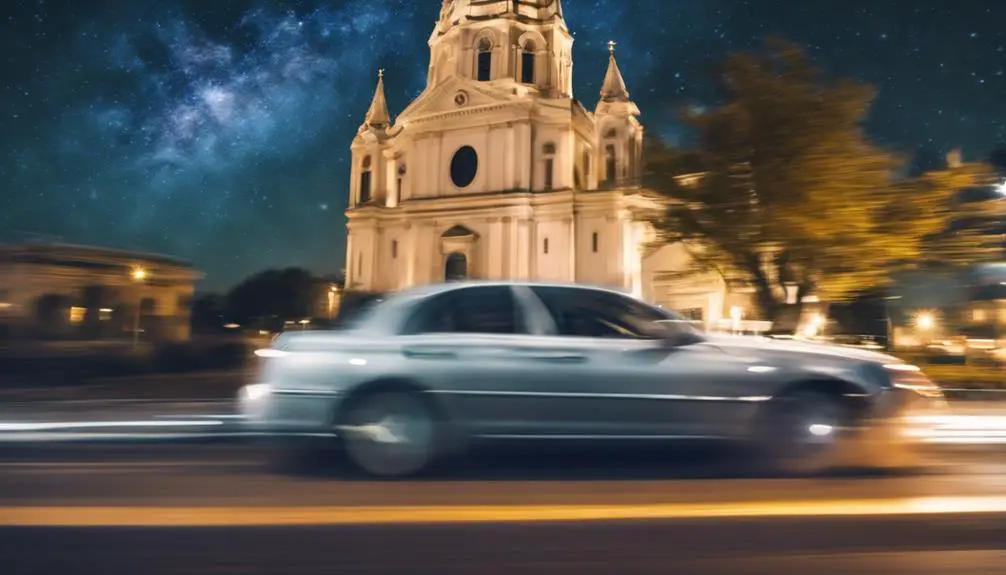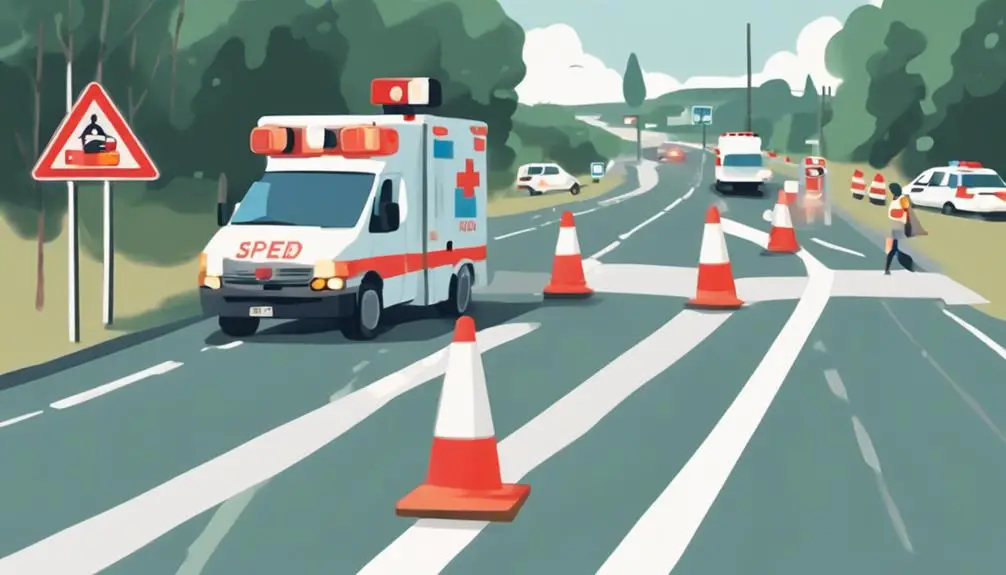Morality meets the road: delve into the debate on whether speeding is merely illegal or crosses into the realm of sinfulness.

Is Speeding a Sin?
Just as you're pondering whether speeding is merely a legal infraction or carries deeper moral implications, it's crucial to consider the multitude of perspectives surrounding this contentious issue.
You're not alone in wrestling with the question of whether pushing the pedal beyond the limit transcends legal boundaries and ventures into the realm of ethical, or even sinful, behavior.
From the standpoint of law, personal accountability, and societal impact, to the nuanced views held by various religious traditions, there's a rich tapestry of arguments to unpack.
Let's navigate these waters together, exploring the intricate intersections of law, morality, and personal conscience that make this topic so compelling.
Key Takeaways
- Speeding contradicts religious principles of love, moderation, non-violence, and duty across major faiths.
- It reflects a moral failing and disregard for community safety and well-being.
- Speeding elevates the risk of harm, undermining the ethical stewardship of life.
- Legal consequences aside, speeding carries significant ethical implications, distancing individuals from communal and divine values.
Legal Perspectives on Speeding

From a legal standpoint, most jurisdictions consider speeding a violation of traffic laws, emphasizing its potential to endanger both the driver and public safety. When you delve into the interpretation of traffic laws, you'll find that they aren't merely arbitrary rules but are established to protect the well-being of society. They're a manifestation of the common good, a principle deeply rooted in many faith traditions. This concept underscores the moral responsibility of adhering to these laws, including those regulating speed on the roads.
However, the enforcement of speeding laws often reveals disparities, raising questions about fairness and justice. You might observe that in some areas, enforcement is rigorous, with strict penalties for even minor infractions, while in others, similar violations are overlooked. This inconsistency in enforcement can lead to confusion and a sense of injustice among drivers, undermining the moral authority of the law. Such disparities call for a more equitable approach to enforcing traffic laws, ensuring that all individuals are held to the same standards, reflecting a commitment to the common good and the protection of all community members.
Moral Implications of Speeding
Having considered the legal perspectives on speeding, it's crucial to explore its moral ramifications, particularly through the lens of faith traditions that emphasize the sanctity of life and the duty to protect it. When you speed, you're not just breaking a law; you're engaging in an act that has profound ethical considerations. The decision to speed can be viewed as a risk assessment, where the potential harm to oneself and others must be weighed against the perceived benefits of arriving at a destination sooner.
Here are three key points to consider:
- Respect for Life: Speeding increases the risk of accidents, which can result in injury or death. Ethically, this raises questions about the value placed on human life and the responsibility to preserve it.
- Community Responsibility: By speeding, you're disregarding the safety and well-being of the community. This act can be seen as a failure to contribute positively to the social fabric, undermining communal harmony and trust.
- Personal Integrity: Choosing to speed reflects on your character and integrity. Ethical living involves adhering to principles even when it's inconvenient, suggesting that respect for laws and the rights of others should guide your actions.
In analyzing speeding from a moral standpoint, it's clear that the act carries significant ethical implications beyond mere legal consequences.
Speeding From a Religious Viewpoint

Religious traditions across the globe often interpret speeding as not merely a legal infraction but a moral lapse, reflecting a disregard for the sacredness of life and communal well-being. You'll find that many faiths articulate divine commands emphasizing respect for life, which inherently includes driving behaviors. Speeding, then, isn't just breaking a law; it's veering away from a path of righteousness, potentially leading to spiritual consequences.
Tradition |
Viewpoint on Speeding |
|---|---|
Christianity |
Seen as a breach of the commandment to love thy neighbor, as reckless driving endangers others. |
Islam |
Considered against the teachings of moderation and could be viewed as harming oneself and others, which is forbidden. |
Buddhism |
Interpreted as a form of harmful action, going against the principle of not causing harm to living beings. |
Hinduism |
May be seen as an act of irresponsibility, violating the principle of ahimsa (non-violence) and dharma (duty). |
In these perspectives, speeding isn't just a minor oversight; it's an action that distances you from divine teachings and community values. Understanding this, you're invited to reflect on how your driving habits align with your spiritual values and the broader implications of your actions on the road.
The Societal Impact of Speeding
Shifting focus to the broader community, it's essential to consider how speeding impacts societal well-being and safety. In the context of moral and ethical discourse, speeding isn't just a matter of personal risk but extends into the realm of communal responsibility. Speeding, by its nature, disregards the well-being of others and can be seen as a failure in stewardship towards our community.
Analyzing the societal impact of speeding reveals:
- Increased Risk of Accidents: Speeding elevates the risk of vehicular accidents, resulting in injuries or fatalities. This heightened risk challenges our moral obligation to protect life, calling for a collective risk assessment to safeguard our communities.
- Economic Effects: The consequences of speeding extend to significant economic effects, including increased healthcare costs due to accidents and the burden on public resources like emergency services. These economic implications reflect a neglect of communal well-being and prudent resource management.
- Social Disruption: Speeding contributes to a culture of recklessness and disregard for laws, undermining social order and faith in legal systems. This disruption erodes the moral fabric of society, highlighting a need for shared values of respect and care for one another's safety.
Reflecting on these points, it's clear that the act of speeding carries deeper societal implications, warranting a thoughtful examination of its moral and ethical dimensions.
Personal Responsibility and Speeding

In examining the issue of speeding from a personal responsibility perspective, you must recognize the moral obligation to safeguard not only your own life but also those around you. This duty extends beyond mere adherence to traffic laws; it encompasses a broader commitment to driving ethics, which dictate a respect for the well-being of others. As you navigate the roads, your actions should be guided by a conscientious risk assessment, weighing the potential consequences of your speed against the safety of fellow travelers.
Speeding, at its core, can be seen as a moral failing, a disregard for the sanctity of life that's entrusted to each driver. The faith-based perspective teaches that stewardship of one's own life and that of neighbors is paramount. This stewardship demands a discipline in driving habits, recognizing that each decision behind the wheel has moral weight.
You're called to exercise prudence and restraint, virtues that stand in direct opposition to the recklessness of speeding. In making the ethical choice to obey speed limits, you affirm the value of life and community safety. Thus, from a standpoint of personal responsibility, speeding not only violates legal standards but also the moral imperatives that bind a conscientious community.
Frequently Asked Questions
How Does Speeding Affect Car Insurance Premiums and Coverage in the Long Term?
Speeding can lead to higher car insurance premiums due to fewer premium discounts and increased risk. In the long term, it might even result in policy cancellation, significantly affecting your financial stability and coverage options.
Can Habitual Speeding Influence a Person's Overall Driving Behavior and Attitude Towards Road Safety?
Yes, habitual speeding can reshape your driving behavior, making you less cautious and more prone to ignoring road safety. It worsens fuel economy and can lead to costly mistakes, especially in adverse weather conditions.
Are There Any Technological Advancements Aimed at Reducing Speeding Incidents Without Relying Solely on Law Enforcement?
Yes, there are advancements like speed governor technologies and intelligent traffic systems aimed at curbing speeding. These tools don't just rely on law enforcement but proactively manage road safety through technological interventions, making roads safer for everyone.
How Do Different Cultures Around the World Perceive Speeding, and Does It Reflect in Their Traffic Laws and Enforcement?
You'll find that cultural norms greatly influence perceptions of speeding, reflecting in traffic laws and enforcement effectiveness worldwide. It's a fascinating study on how different societies balance safety, legality, and moral considerations in their regulations.
What Psychological Factors Might Drive an Individual to Consistently Speed, Despite Understanding Its Risks and Consequences?
You might speed due to thrill-seeking behavior or peer pressure, despite knowing the dangers. Analyzing this, it's clear that seeking excitement or fitting in can overshadow your awareness of potential risks and consequences.
Conclusion
In conclusion, from a legal, moral, and religious standpoint, speeding transcends mere legal infringement. It embodies a breach of societal trust and personal ethics.
Scriptures across faiths advocate for respect towards communal laws and the wellbeing of others, positioning speeding as contrary to spiritual teachings.
Analyzing societal impacts underscores the ripple effect of such actions, emphasizing personal responsibility.
As stewards of faith and community, it's imperative to reflect on the broader implications of our choices, including the seemingly benign act of speeding.



Sign up